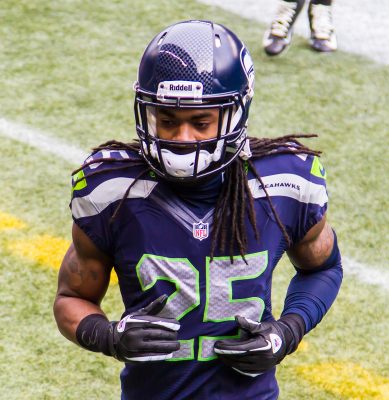
On Thanksgiving Day, after my stomach was packed to my liking with turkey, potatoes and pie, I sat in front of my television to do what millions of other Americans have done for decades — watch football. But this Thanksgiving may have experienced fewer TV sets tuned into the NFL than in years past.
Thus far in 2016, the ratings juggernaut that is the National Football League has been lagging behind its usual numbers. In searching for the cause(s) of the drop, the media, players and league have scrutinized every facet of the game. Each has come up with its own reason why Americans haven’t been tuning into the gridiron every Sunday (and Monday and Thursday) quite as reliably.
Many are pointing to surface level factors: the retirement of Peyton Manning or the election cycle, which may have sucked viewers away from games to watch debates and news coverage.
Statistically, these reasons are very sound.
Another scapegoat has been the national anthem protests made most notable by 49ers quarterback Colin Kaepernick. In a highly publicized poll in early October, 32 percent of subjects said the anthem protests made them less likely to watch a game. This internal controversy is certainly a more serious issue for the NFL, but still not something that is likely to persist far into the future in this specific form.
Others have asserted that football’s loss of viewership is simply a part of the overall decline of cable and network TV in the era of online streaming and subscription services. This might present a long-term problem for the league, but again, it does not suggest any flaw specific to the game or the way it is presented and run.
These reasons undoubtedly account for some of this season’s disparity, but it seems naïve to stop there and not dig into issues with the game itself that may be dragging it down.
Many of sports’ most outspoken personalities have not been kind in their assessment of the current state of the NFL. Dallas Mavericks owner Mark Cuban gave an interview in which he claimed that the NFL was getting too big and too greedy for its own good.
Seattle Seahawks cornerback Richard Sherman, who is a frequent spokesman for players’ issues, says people aren’t watching “because the league isn’t fun anymore.”
Sherman is critical of the NFL’s policing of its players’ expression on and off the field, saying, “They’re no longer allowing the players to show any kind of personality, any kind of uniqueness, any individuality. Because they want to control the product.”
In the interest of feeling important, I would like to add my own assessment to the mix: the recent election has affected people’s desire to watch football, but not simply because they are too busy watching CNN.
I feel that football has lost its place as a culturally unifying force and ceased to be a refuge from the rhetoric, manipulation and guilt that plagued this political season in particular. At one time, football was as wholesomely American as apple pie or Tom Hanks.
But recently, the NFL has been battered by one scandal after another, from domestic violence, to concussions, to the anthem protests, and its image has taken a serious hit. On Thanksgiving Day, football has usually been the way we escape our relatives bickering in the next room, something that can relax us.
Now, it seems that the ugly politics Americans have grown so weary of these past months has tainted the NFL as well, and people are turning away.
I sincerely hope I am wrong in this assessment, or that this disillusionment does not last.
After all, what else am I going to watch on Thanksgiving? The National Dog Show?











